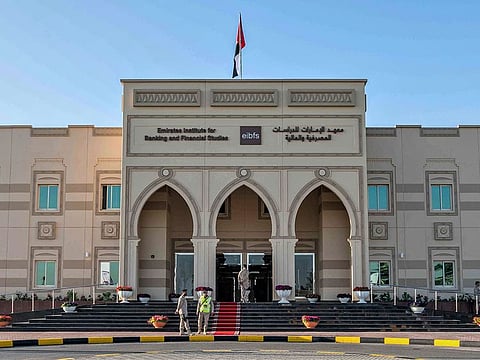EIBFS is committed to creating bankers for future: Al Jassimi
Over the past 38 years the instiute has trained 292,887 banking professionals

Dubai: Emirates Institute for Banking and Finance Studies (EIBFS) is committed to training world-class finance professionals in sync with UAE’s vision of becoming a knowledge-based economy, Jamal Al Jassmi, General Manager told Gulf News.
“Over the past 38 years, we’ve taken the onus to enable banking professionals in the UAE by training them and have successfully trained over 292,887 professionals,” said Al Jassmi. In 2021, it trained 32,317 professionals of which 36 per cent were Emirati bankers.
Ready for digital future
With the digitalization sweeping through the banking industry, EIBFS too has made significant changes in its training programmes to prepare bankers for challenges in digital transformation. “As an active architect of the financial training industry, a big part of our agenda is to monitor the trends in the industry and work towards ensuring that these are embedded in our learning modules in line with the UAE’s government’s vision,” said Al Jassmi.
“This year, we introduced a four-prong future skills model, which extensively focuses on digital fluency by offering courses in AI, Blockchain, Data Analytics, etc. The other areas that this model emphasizes on is developing key business and social skills as well as mindset building.”
With the adoption of digitalization and wide use of artificial intelligence, the banking industry in the country has seen a steady decline in branch operations and redeployment of employees in different tasks. “To be honest, we do not see a challenge with aspiring banking professionals," he added. "The new generation of banking and finance students are in tune with the technological disruption in the sector and have been exposed to a digital, tech-driven banking space.”
The older generation bankers who are used to certain processes and operating models could find the changes challenges. For this group, there is an urgent need for re-skilling to prepare them for the current transformation as well as any potential future disruptions.

Fintech challenges
Like most of the industry, IBFS has realized that the disruption to the current business world requires employees to acquire new skills. Through its in-depth research and by collaborating with several international institutions, it has created a future skill map model.
“This model features four quadrants - Digital Skills, Functional Skills, Emotional Skills and the development of mindsets. The intention behind introducing this model is to ensure that banking professionals can compete with fintechs,” said Al Jassmi.
The important thing here is to teach the next generation how technology can be leveraged in day-to-day jobs. To this end, IIBFS has introduced technology-led modules that combine knowledge of the business domain and technical skills to create bankers who can understand, appreciate and implement technology, especially the emerging technologies in the business.
Key partner in Emiratisation
“When it comes to UAE Nationals, we have developed a comprehensive national plan to skill, reskill and upskill UAE nationals to ensure that they remain up-to-date on current matters and are capable of securing high-potential jobs in the banking sector. We are a strategic partner to the government in its Emiratization strategy,” Al Jassmi said.
Under the directive of the UAE government, IBFS is working on building a new generation of Emirati talent in specialized roles. To cater to the growth of EIBFS’s UAE National trainees, the institute has developed 14 skill and competency-based pathways, which are accredited by the Chartered Banker Institute in the UK, which is one of the world’s oldest banking institutes.
Islamic banking
In the context of Islamic banking, Islamic capital markets and Takaful (Islamic insurance) emerging as a key component of UAE’s financial services sector, the institute has special emphasis on training Islamic banking professionals.
EIBFS was the first regional institute to introduce an academic accredited diploma in Islamic Banking back in 2003.
“In the UAE, AAIOFI standards have been implemented by the Higher ShariahAuthority of the Central Bank and we have recently partnered with them to create a new program called the Certified Islamic Banker, which is exclusively available to our trainees in the UAE. For this course, we issue a joint certificate from EIBFS and AAIOFI,” said Al Jassmi.
Emirates Institute for Banking and Financial Studies (EIBFS)
The Emirates Institute for Banking and Financial Studies (EIBFS) was founded in 1983. Based in the UAE, EIBFS currently has three campuses for education and training services in Sharjah, Abu Dhabi and Dubai.



